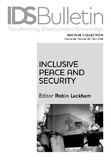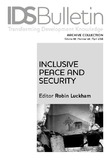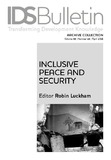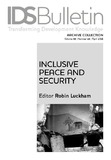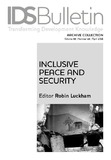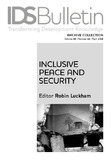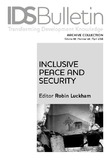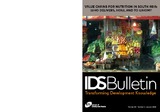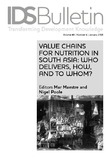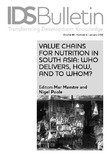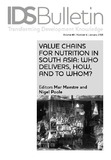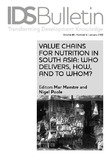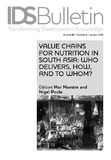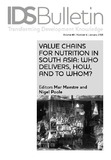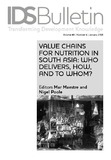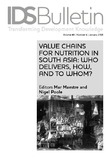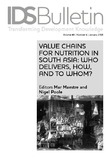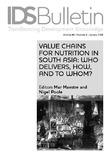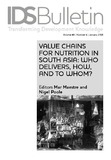2018: Recent submissions
Now showing items 61-79 of 79
-
Peace Through Agrarian Justice
(Institute of Development Studies, 2005-06)The extent to which recent African civil wars have also been agrarian crises has been underestimated. Urban “loose molecules” and the lure of mineral resources have been put forward as reasons for protracted conflicts. ... -
‘Security from Below’ in Contexts of Chronic Violence
(Institute of Development Studies, 2009-03)At the same time that the field of security moves away from traditional state-centred perspectives towards a human-centred understanding of security, contemporary states seem to be incapable of protecting people from ... -
Gendering the New Security Paradigm in Sri Lanka
(Institute of Development Studies, 2009-05)This article points to the significant military turn that has taken place in Sri Lanka following the armed conflict between the Sri Lanka government forces and the Liberation Tigers of Tamil Eelam (LTTE). It is particularly ... -
Researching the Gendered Silences of Violence in El Salvador
(Institute of Development Studies, 2009-05)All research on violence is informed by silences. In practical terms, an immediate reading of silence may be that it presents an obstacle for the researcher who is dependent on people who are willing to speak out. Another ... -
Quantitative Methods in Contexts of Everyday Violence
(Institute of Development Studies, 2009-05)The analysis of violence from an individual or household perspective is arguably one of the most challenging research areas in social science. Outbreaks of violence affect the core of human relations and social norms. ... -
Crime and Social Cohesion in the Time of Crisis: Early Evidence of Wider Impacts of Food, Fuel and Financial Shocks
(Institute of Development Studies, 2009-09)Economic crises have a series of impacts on society and security, depending on their severity, and on people’s capacities to cope with and adapt to stresses on livelihoods and community relations. This article highlights ... -
Social Contracts, Networks and Security in Tropical Africa Conflict States: An Overview
(Institute of Development Studies, 2013-01)In this IDS Bulletin we present fieldwork from articles covering the Democratic Republic of the Congo, Côte d’Ivoire, Sierra Leone, Mozambique and Somalia to show that assumptions derived from the classical social contract ... -
Value Chains for Nutrition in South Asia: Who Delivers, How, and to Whom?
(Institute of Development Studies, 2018-01-31)There is currently much talk of the private sector role in nutrition, and whether the state can ‘shape’ the market to deliver better nutritional outcomes. This issue of the IDS Bulletin presents research findings in this ... -
Introduction: Value Chains for Nutrition in South Asia: Who Delivers, How, and to Whom?
(Institute of Development Studies, 2018-01-31)There is currently much talk of the private sector role in nutrition, and whether the state can better ‘shape’ the market to deliver nutritional outcomes. This article introduces an issue of the IDS Bulletin which ... -
Notes on Contributors: Value Chains for Nutrition in South Asia: Who Delivers, How, and to Whom?
(Institute of Development Studies, 2018-01-31)This is the notes on contributors for IDS Bulletin 49.1, '‘Value Chains for Nutrition in South Asia: Who Delivers, How, and to Whom?’ -
Glossary: Value Chains for Nutrition in South Asia: Who Delivers, How, and to Whom?
(Institute of Development Studies, 2018-01-31)This is the glossary of IDS Bulletin 49.1, 'Value Chains for Nutrition in South Asia: Who Delivers, How, and to Whom?’. -
Focus on Gender, Context, and Evidence: CARE’s Lessons Learned
(Institute of Development Studies, 2018-01-31)This article explores the most effective ways to influence nutrition through value chains, based on CARE’s long history in food and nutrition security. With implementation experience in 90 countries and evidence from 11 ... -
A Study on Milk Value Chains for Poor People in Bangladesh
(Institute of Development Studies, 2018-01-31)Child and maternal undernutrition is still prevalent in Bangladesh and poor dietary diversity is one of the major causes. While milk can contribute to nutritional requirements, currently availability in Bangladesh is ... -
Building Dairy Value Chains in Badakhshan, Afghanistan
(Institute of Development Studies, 2018-01-31)Considerable recent research has tried to link agricultural production and the distribution of nutrient-rich foods to consumption, and hence improved health, of nutritionally vulnerable population groups. However, we are ... -
‘Milk for Milk, Water for Water’: Analysing Pakistan’s Dairy Innovation
(Institute of Development Studies, 2018-01-31)Interventions in agri-food value chains are thought to potentially make important contributions towards enhancing agriculture’s role in nutrition. Some frameworks have begun to identify sets of requirements for pro-nutrition ... -
Food Distribution Value Chains under the Integrated Child Development Services
(Institute of Development Studies, 2018-01-31)Globally, social provisioning of food is recognised as an important means to reduce the prevalence of malnutrition. Government food distribution programmes have potential for impact at scale in this context. This article ... -
Going Against the Grain of Optimism: Flour Fortification in Pakistan
(Institute of Development Studies, 2018-01-31)Food fortification is a popular strategy for addressing ‘hidden hunger’, and staple foods are seen as promising, if unproven, vehicles for the delivery of essential micronutrients to poor people in developing countries. ... -
Business-Based Strategies for Improved Nutrition: The Case of Grameen Danone Foods
(Institute of Development Studies, 2018-01-31)There is increasing interest in the role that businesses can play in promoting the consumption of nutrient-dense foods as part of strategies to reduce the prevalence of micronutrient deficiencies in developing countries. ... -
Private Business-Driven Value Chains and Nutrition: Insights from India
(Institute of Development Studies, 2018-01-31)Despite rapid economic growth, undernutrition rates in South Asia remain among the highest in the world. It is also seen that both rural and urban populations in developing countries are increasingly dependent on markets ...

